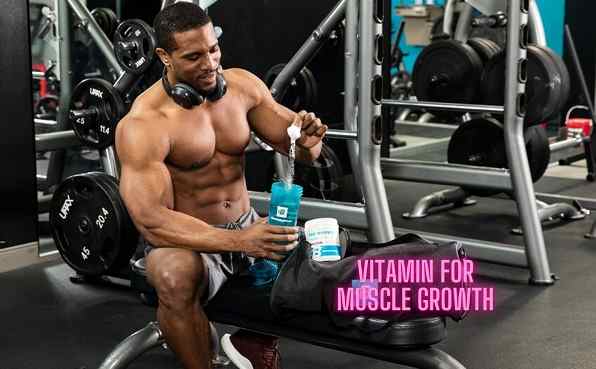5 Vitamins required for Muscle Growth
The way of building your dream body as you drive or walk home from the gym?
Growth and repair of muscle tissue occur on a cellular level. These processes depend on various minerals and vitamins, among other things.
Although the latter are usually present in a balanced diet, many athletes find that the lack of certain substances leads to poorer performance.

In this article, we will tell you about the five best vitamins for muscle growth and recovery, and which foods contain the most of them. So read to the end. It will be informative.
Vitamin A is undeservedly neglected in the sports nutrition industry. It is well known for its beneficial effects on eye health, but its many other effects are often.
Vitamin A is good for athletes because it supports muscle protein synthesis and thus muscle growth.
Protein synthesis increases when Levels of a substantial decrease in the body. It’s used in the breakdown of protein during muscle tissue repair.
You may be convinced by the fact that vitamin A has a direct effect on testosterone, the powerful anabolic hormone.
In a study of 102 adolescents suffering from delayed puberty, vitamin A and iron show the same positive effect as hormone therapy, oxandrolone, and testosterone.
Suggests that vitamin A Defi CNC can negatively affect testosterone production in men of all ages. Vitamin A plays a role in ensuring the strength of the musculoskeletal system by promoting bone development and the maturation of young cells.
Foods contained the most vitamin A fish oil from cod liver black caviar, red caviar beef liver, egg yolk, chicken and quail eggs butter and hard cheese carrots, bell peppers, asparagus, broccoli, celery, parsley, dill, spinach, sorrel, cilantro, green onions, leeks, basil, dried apricots, plums, rowan, dried unpitted apricot rosehips, sea buckthorn.
2- Vitamin D
Vitamin D is necessary for muscle growth and recovery.
Calciferol is unique in that the body needs exposure to direct sunlight to stimulate its production.
We’ve all heard that vitamin D is important in preventing diseases such as softening of the bones in adults and rickets in children and that many people suffer from a lack of it.
How can it affect muscle growth and recovery?
Vitamin D is the most important to produce testosterone.
Some studies have shown that taking supplements with this vitamin, compared to taking a placebo, significantly increases explosive strength in adults after twelve weeks of strength training.
Vitamin D also plays a key role in protein synthesis and affects testosterone production.
According to studies, vitamin D supplements lead to a 20% increase in testosterone in men with low levels of this anabolic hormone, and calciferol is required for bone health.
A list of foods high in vitamin D fish oil, cod liver Pink salmon, and other oily fish Black Caviar, Egg yolk, Goat milk Butter Hard Cheeses, etc
3- Vitamin C
Vitamin C is popular vitamin among people. Everyone has ever had a cold, and the doctor advised eating ascorbic acid.
- Ascorbic acid is a strong antioxidant that helps protect muscle cells from the damaging effects of free radicals.
- It helps the body in the synthesis of testosterone and other anabolic hormones.
- Vitamin C promotes the formation of collagen, a protein that is the main component of connective tissue. Collagen is beneficial for joint stability which can lift heavier weights and reduce the risk of injury.
Finally, researchers at the University of North Carolina found that taking vitamin C before and after exercise reduces muscle soreness and prevents oxidation of glutathione and a powerful antioxidant.
That is important because delayed muscle soreness syndrome, crematoria is not a pleasant sensation, and ascorbic acid reduces it at the cellular level.
4- Vitamin E
Vitamin E is used for various purposes in muscle growth. Many people know it only is a remedy for stretch marks and other skin imperfections.
There is good news for athletes as well. Vitamin E is a powerful antioxidant. Intense training produces free radicals in the body, which are toxic byproducts of cellular respiration.
The accumulation of these particles in the body causes impaired performance, muscle growth, recovery, and immunity.
Vitamin E acts to reduce radicals and flushes toxins out of the body. The result is reduced oxidative stress and reduced muscle damage.
In addition, vitamin E is being studied as a natural preventive and treatment for carotid artery atherosclerosis narrowing of the arteries due to oxidative stress.
Thus, vitamin E can support muscle growth and accelerate recovery. That provides more nutrients in the blood and allows a positive effect on blood pressure and a positive effect on blood pressure.
Foods rich in vitamin E vegetable oil, almonds pie, nuts, broccoli, mangoes, sunflower seeds, avocado, peanut butter, Atlantic salmon, sweet bell pepper,
5- Vitamin B
Vitamins B Six, Pyrotoxine, B Nine, folic acid, and B Twelve are probably the most important B vitamins when it comes to muscle growth and recovery from exercise.
B Six and B Twelve are directly involved in protein metabolism. Scientists say that the higher the protein intake, the more vitamin B Six is required for its processing in the body.
Another interesting fact is that Pyridoxine is necessary for the normal absorption of vitamin B twelve.
Together, these substances are used in the production of red blood cells and immune system cells, which are invaluable for muscle growth and repair.
Taking folic acid in combination with vitamins B Six, and B Twelve can reduce homocysteine levels, a risk factor for atherosclerosis, and improve nitric oxide production and cardiovascular function.
As a result, the body improves blood flow and the supply of nutrients to working muscles. Foods that contained the most vitamin B are salmon, trout, liver, beef, spinach and other leafy greens, pork, chicken, and eggs.